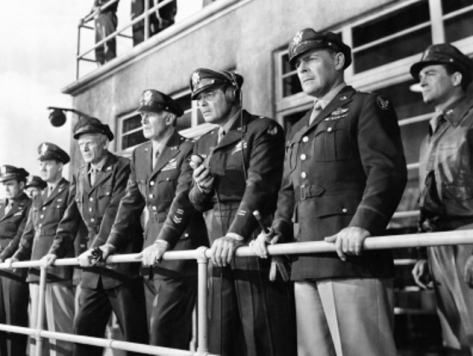Groucho Marx and director Sam Wood never got along. Besides their political differences (Wood was a Republican, Groucho was not), both were notoriously prickly personalities. The legend goes that during a particularly tense moment on the set, Wood said to Groucho, “You can’t make an actor out of clay.” And without missing a beat, the brilliant Groucho hit back with, “And you can’t make a director out of wood.”
—

—
Whether the anecdote is true or not, who cares. It’s a great story. But what isn’t true is Groucho’s sentiment. Wood not only directed two Marx Brothers’ masterpieces (“A Night at the Opera,” “A Day at the Races”) but is also responsible for “Goodbye, Mr. Chips,” “Our Town,” “Kitty Foyle” (a personal favorite), “The Devil and Miss Jones,” “Pride of the Yankees,” and the unqualified masterpiece, “Command Decision.”
Other than a tense sequence involving the talking down of a crippled bomber, “Command Decision” contains no action whatsoever. Like Sam Fuller’s “Merrill’s Marauders” (1962) and Henry King’s “Twelve O’Clock High” (1949), this isn’t a World War II film about battle, it is instead an examination of the physical, psychological, and emotional toll battle has on those who fight them and order them to be fought.
A perfect Clark Gable (who lobbied for the role) is Brigadier General K.C. “Casey” Dennis, a man dedicated to defeating the Nazis but forced to constantly fight his own boss, Major General Roland Kane (Walter Pidgeon). Both are good men, both want to end the war, both love their “boys,” and both are always looking at the big picture.
It is those big pictures, though, that constantly clash as Casey pushes to bomb into oblivion three German factories producing a new fighter jet that could win Hitler all of Europe. The cost of those bombing runs, unfortunately, is appallingly high casualties that could cost Kane the congressional appropriations the Army so desperately needs to also win the war.
“Command Decision” serves up a half-dozen military archetypes and explores the humanity behind them: The tough-as-nails commander (Gable), the politicking general (Pidgeon), the career climber (a fantastic Brian Donlevy), the above-it-all scrounger (Van Johnson), and even the sanctimonious journalist (Charles Bickford). And that’s the genius of the story.
The heart of the story, though, is that what is never forgotten is what all of those decisions come down to: the exhausted, shattered, terrified, and unbelievably valiant men who volunteer to climb into those bombers to fly hundreds of miles into a Germany peppered with anti-aircraft guns.
It is impossible for me to do justice to “Command Decision,” which is, in my opinion, one of the five greatest World War II films ever produced. Every aspect of the production is grade-A, including the performances — but most importantly the theme.
Gable’s driven but tortured general describes what he does as “killing.” Not killing Germans, but killing his own men through his command decisions.
This is a film about sacrifice; yes, the sacrifice of life and limb, but also the sacrifice of being able to live with yourself in order to do what needs to be done to defend a country founded on an ideal worth all of it.
Hollywood used to be great.
“Command Decision” is available at the Warner Archive.
Follow John Nolte on Twitter @NolteNC

COMMENTS
Please let us know if you're having issues with commenting.